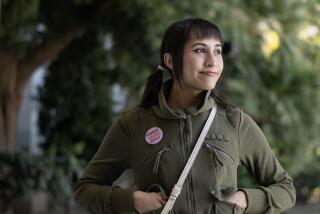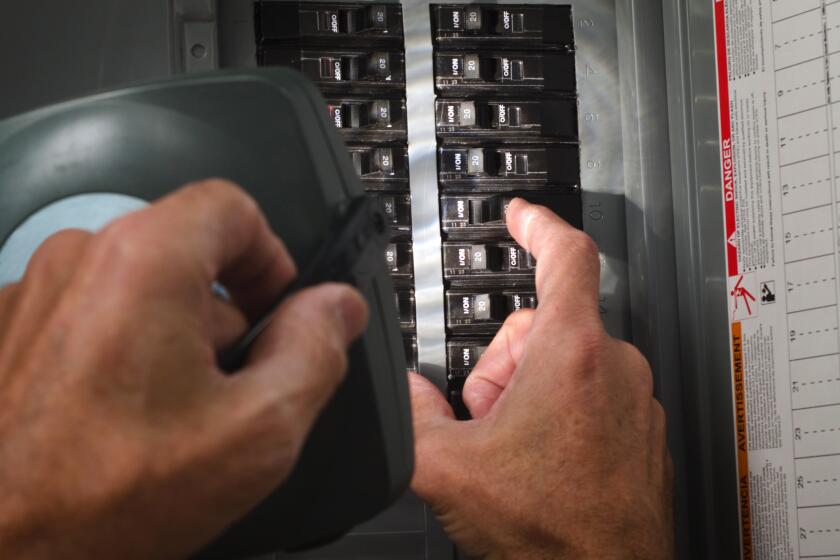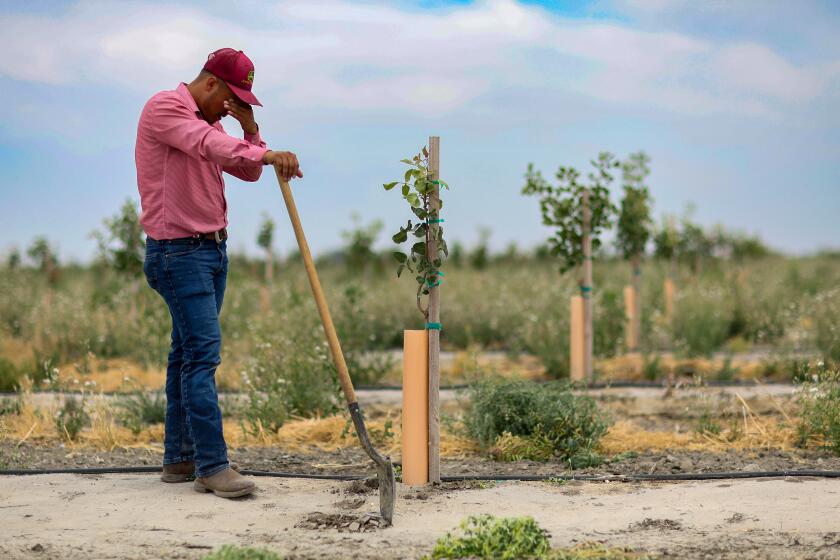Parents of Slain Children Needn’t Face Grief Alone
It’s been nearly seven months since 9-year-old Autumn Wallace was murdered, and most of those who were close to her have buried their pain and moved on with their lives.
But not her mother, Linda Wallace. Although she has returned to work and usually tells people she’s fine when they ask, her grief is still intense.
She still needs to talk about Autumn, to share the good memories that she hopes will someday stop her from dwelling on her daughter’s violent death. But the number of relatives and friends who understand that need and are willing to listen has dwindled to just a few.
One friend who is still there for Wallace is Linda Hand, the mother of Autumn’s best friend.
Wallace asked for Hand almost immediately after she came home from work about 5:45 p.m. on June 15 and found Autumn’s body lying face down in a pool of blood in the bathroom.
When Hand arrived at the neighbor’s house where Autumn’s family had gathered, a distraught Wallace grabbed her and cried: “Linda, make it not be true. Please bring my baby back!”
Autumn had been stabbed repeatedly while she was alone in her house on Hudlund Drive in an unincorporated area between Stanton and Anaheim, waiting for her mother and 18-year-old sister, April, to get home from work.
While the murder was still making headlines, 42-year-old Linda Wallace was surrounded by warm, caring people who did their best to comfort her. But then the support system that enveloped her in the first weeks of shock and sorrow began to break down, and Wallace, whose husband died of cancer three years ago, felt increasingly alone in her grief.
Desperate to find people who could understand what she was feeling, she turned to the Orange County chapter of Parents of Murdered Children for support.
She also began seeing a therapist once a week and found herself growing closer to Hand, who had been a casual acquaintance before Autumn’s death but had become the one friend with whom Wallace felt completely free to talk.
It’s rare to have a friend like Hand who is willing to stay close during what may seem like an endless period of mourning, says Kathryn Yarnall, who is assistant director of the Irvine-based Victim/Witness Assistance Program and who leads the monthly meetings of Parents of Murdered Children.
She says well-meaning friends often tell survivors, “You’ve got to put this behind you and get on with your life.”
But, Yarnall notes, such advice doesn’t help those who are still overwhelmed by a loss that is especially difficult for survivors to accept because it resulted from a violent act and because they must relive it again during a murder trial that subjects them to repetitive, often insensitive questions from attorneys and reporters.
Charlotte Hullinger, who founded Parents of Murdered Children in Cincinnati, Ohio, in 1978 after her daughter, Lisa, was killed, gives this explanation for creating a comfortable place for survivors to talk:
“The anger felt by a parent of a murdered child is too threatening to many people, so they try to calm us down and discourage us from fully experiencing the intensity of our emotions. And yet if healing is to take place, it must be by expressing and working through our feelings, no matter how negative or destructive they may seem to others, rather than by denying and repressing them.”
In “Beyond Sympathy,” author Janice Harris Lord observes that “our society expects people to recover from losses very quickly. People tire of listening and supporting.” Or, she adds, “they abandon their friend or loved one because they don’t know what to say or do.”
Yarnall says friends may also withdraw out of fear. “At some level people become afraid because murder is something that happens to somebody else, not somebody you know,” she explains.
When it happened to Autumn, Linda Hand didn’t suffer any of the uncertainties or fears that keep some friends from reaching out to bereaved loved ones. In a way, she was grieving for a lost daughter, too, so she felt a special bond with Wallace.
Autumn and Hand’s 9-year-old daughter, Ronelle, had been friends since they were 4, but they became especially close after Autumn’s father died and her mother had to start supporting her family alone.
Autumn used to spend almost every weekend with the Hands, who lived just a few blocks away, and she joined Ronelle and her parents on many outings and short trips. She was treated like a member of the family, says Hand, who recently put together a scrapbook of pictures showing a smiling Autumn playing with her best friend.
“I miss her terribly--she was such a big part of our lives,” says the 40-year-old nurse, who works at Anaheim General Hospital.
Both Wallace and Hand say they still dread Friday evenings, when they struggle with memories of that evening last June when Autumn’s death brought them together. Wallace says she always tries to plan something after work so she doesn’t have to go directly home. And Hand says she often finds herself driving down the street where Autumn lived, feeling lonely and depressed.
“We both lost someone we love very much,” Wallace said on a recent afternoon when Hand was visiting. “We both know how great she was. She was as near perfect as a kid could be.”
Autumn’s natural inclination to help others is probably what prompted her to open the door for Maria del Rosio (Rosie) Alfaro, the 19-year-old woman who was charged with first-degree murder after a fingerprint found in the Wallace home led to her arrest.
The Anaheim woman--who was a high school acquaintance of Autumn’s sister, April--told investigators that she took $300 worth of household items from the Wallace home to buy drugs and killed Autumn to keep from being caught, according to transcripts of a police interview made public in November.
Alfaro is being held without bail pending her trial, which was scheduled to begin May 21.
Among Autumn’s belongings, which Wallace has only recently been able to go through, is a diary with a drawing of two stick figures, one of whom is saying, “I promise I won’t open the door to strangers.”
“She knew,” Wallace says, “but this girl wasn’t a stranger.”
Wallace, who works as a clerk at the Orange County Courthouse in Santa Ana, says she feels no guilt about leaving Autumn alone for a couple of hours in the afternoon while she tried to arrange for day care.
“She was old enough and mature enough to be home. I trusted her. She was very cautious. She wouldn’t let just anybody in. She was in the wrong place at the wrong time,” Wallace says.
But she is still tormented by her last image of Autumn and the picture of how her child might have suffered just before she died.
“That’s all I thought about the first few months, and I’m still trying to get rid of that picture. You don’t want your child to ever have pain,” says Wallace, who moved into a gated community in Garden Grove with her boyfriend after the murder because she couldn’t bear to return to the home where she had lived for 17 years.
She recently had a dream in which Autumn crawled into her bed and snuggled up to her. “It made me feel good all day. It shows I’m starting to think about her life instead of her death.”
Wallace can share both her ups and downs with Hand, who also finds comfort in remembering the good times with Autumn.
“I always feel better when I’m with Linda,” Hand says. “I feel lucky she let me into her life. Otherwise, the pain would be unbearable.”
Wallace and Hand get together at least once a week and talk about the good-natured little girl who loved them both. Autumn--who had long blonde hair, brown eyes and round, rosy cheeks--loved to swim, draw, play Nintendo games and watch “Star Search,” and she was an A student at Dr. Jonas E. Salk Elementary School in Anaheim. One of her favorite pastimes when her father was alive was going fishing with him.
The way Autumn dealt with his death has been an inspiration to her mother and has helped Hand comfort her daughter, who for a long time refused to talk about the friend she’d lost. Wallace says that after Autumn’s father died, she talked only about the fun she’d had with him. She’d tell her mother, “He’s up there fishing in heaven, and he’s probably catching a lot of big ones.”
Hand regularly attends the Parents of Murdered Children meetings with Wallace. Hearing the stories of others whose children have been murdered “helps you forget your own pain for awhile,” she explains.
Wallace says it gets easier each time she goes to share her story, and she’d “explode” if she didn’t have that outlet and a friend like Hand to make sure she gets there when it seems so much easier to stay home.
The people Wallace has met through Parents of Murdered Children understand better than anyone what she’s going through, and they’ve been able to help by reassuring her that she won’t be grieving forever.
Yarnall says survivors learn by relating to others in the support group that “things will never get back to where they were before, but eventually people will reach a ‘new normal.’ They will experience joy again and won’t be totally focused on their murdered loved one or the fact they they are a homicide survivor. But their lives are changed forever.”
Wallace says she thinks often of the words of one man whose child was murdered some time ago. He told her, “You can either become bitter or better.”
“I don’t want to be bitter. One person did this--not the whole world,” she says. “I have two daughters and three grandsons, and I have a lot to live for. Autumn loved life, and I’m not going to give up mine because she’s gone.”
Hand says she plans to be at Wallace’s side during the trial. And she’s grateful that she will be able to continue working through her own grief as she offers support to Wallace.
Hand reflects: “You are together and then suddenly an angel like Autumn is brutally taken away and you can never bring her back. If you can be with someone you have a bond with and look at pictures together, you can be with her for a little while and let go of that heavy feeling of total despair.
“That’s what friends can do.”
More to Read
Sign up for Essential California
The most important California stories and recommendations in your inbox every morning.
You may occasionally receive promotional content from the Los Angeles Times.






